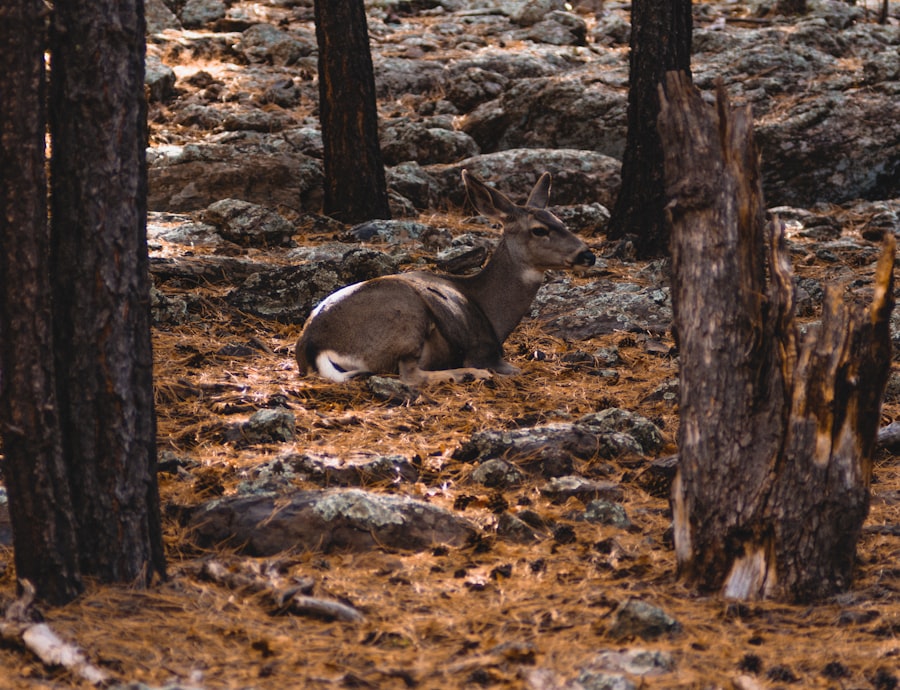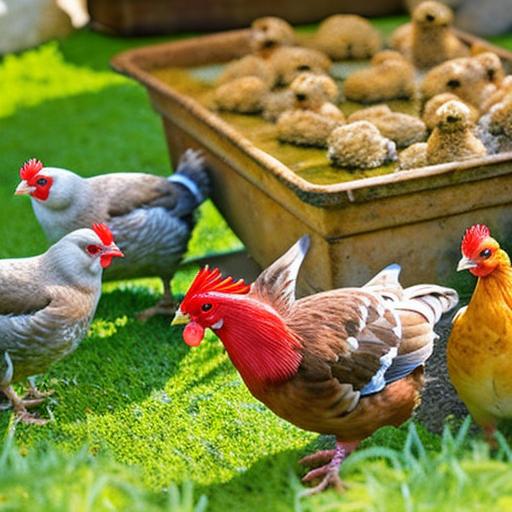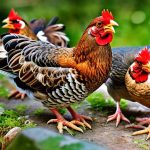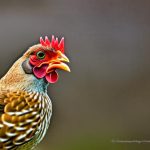Keeping chickens cool in the summer is crucial for their health and well-being. As temperatures rise, chickens are susceptible to heat stress, which can have negative effects on their overall health and productivity. Understanding the importance of keeping chickens cool and implementing strategies to do so is essential for any chicken owner.
Key Takeaways
- Keeping chickens cool in summer is important for their health and productivity.
- Heat stress can cause negative effects on chickens, including decreased egg production and even death.
- Providing adequate shade and proper ventilation in the coop can help keep chickens cool.
- Hydration is crucial for chickens in hot weather, and choosing the right waterer is important.
- A balanced diet is essential for chickens in summer, and creative DIY ideas can help keep them cool.
Understanding the Importance of Keeping Your Chickens Cool in the Summer
Chickens are particularly susceptible to heat stress due to their inability to regulate their body temperature effectively. Unlike humans, who can sweat to cool down, chickens rely on panting and seeking shade to stay cool. When temperatures rise above a certain threshold, chickens can experience heat stress, which can lead to a range of negative effects.
Keeping chickens cool in the summer is important for their health and well-being. Heat stress can cause a decrease in egg production, as hens may stop laying altogether or produce smaller eggs. Additionally, heat stress can lead to increased mortality rates, as chickens may become dehydrated or suffer from heat stroke. By taking steps to keep chickens cool, owners can ensure that their flock remains healthy and productive.
The Negative Effects of Heat Stress on Your Chickens
Heat stress can have a range of negative effects on chickens. One of the most significant impacts is a decrease in egg production. When hens are exposed to high temperatures, they may stop laying altogether or produce smaller eggs with thinner shells. This can be detrimental for those who rely on their flock for a steady supply of eggs.
Heat stress can also increase mortality rates among chickens. When temperatures rise, chickens may become dehydrated, leading to organ failure and death. Additionally, heat stress can cause chickens to suffer from heat stroke, which can be fatal if not treated promptly.
Tips for Providing Adequate Shade for Your Flock
| Tip | Description |
|---|---|
| Location | Choose a shaded area that is protected from wind and predators. |
| Size | Provide enough shade for all birds to comfortably fit under. |
| Material | Use materials that provide adequate shade, such as trees, tarps, or shade cloth. |
| Orientation | Position the shade structure to provide shade during the hottest part of the day. |
| Cleanliness | Regularly clean the shade area to prevent buildup of droppings and debris. |
Providing shade for chickens is essential for keeping them cool in the summer. Shade helps to reduce the direct heat from the sun and provides a cooler area for chickens to rest and seek relief from the heat. There are several ways to create shade in the chicken coop and run.
One option is to plant trees or install shade cloth over the chicken run. Trees provide natural shade and can also help to cool the surrounding area. Shade cloth is a more immediate solution and can be easily installed over the run to provide shade throughout the day.
Another option is to create shade within the chicken coop itself. This can be done by installing awnings or using reflective materials on the roof to reduce heat absorption. Additionally, providing ample ventilation in the coop can help to keep the air circulating and prevent it from becoming too hot.
The Benefits of Proper Ventilation in Your Chicken Coop
Proper ventilation is crucial for keeping chickens cool in the summer. Ventilation helps to remove hot air and moisture from the coop, allowing fresh air to circulate and keep the temperature down. Without adequate ventilation, the coop can become hot and stuffy, leading to heat stress in chickens.
Improving ventilation in the chicken coop can be done by installing windows or vents that can be opened and closed as needed. This allows for airflow during hot days and can be closed during cooler nights. Additionally, ensuring that there are no obstructions blocking airflow, such as bedding or nesting materials, is important for maintaining proper ventilation.
The Role of Hydration in Keeping Your Chickens Cool

Hydration is essential for keeping chickens cool in the summer. Chickens need access to clean, fresh water at all times to stay hydrated and regulate their body temperature. Dehydration can lead to heat stress and other health issues, so it is important to ensure that chickens have access to water throughout the day.
To ensure that your chickens have access to clean water, it is important to regularly check and refill their waterers. Waterers should be cleaned regularly to prevent the growth of bacteria or algae. Additionally, providing multiple waterers throughout the coop and run can help to ensure that all chickens have access to water, especially during hot days when they may be seeking relief from the heat.
Choosing the Right Waterer for Your Flock
Choosing the right waterer for your flock is important for ensuring that chickens have access to clean water. There are several types of waterers available, each with its own advantages and disadvantages.
One option is a traditional open waterer, which is a simple dish or trough that holds water. This type of waterer is easy to clean and refill, but it can also become easily contaminated with dirt or droppings.
Another option is a nipple waterer, which has small nipples that chickens can peck at to release water. This type of waterer is more hygienic, as it reduces the risk of contamination, but it can be more difficult to clean and may require additional equipment for installation.
Choosing the right waterer for your flock depends on your specific needs and preferences. It is important to consider factors such as ease of cleaning, risk of contamination, and the number of chickens in your flock when selecting a waterer.
The Importance of a Balanced Diet for Your Chickens in the Summer
A balanced diet is important for chickens in the summer to ensure that they receive the necessary nutrients to stay healthy and cool. During hot weather, chickens may eat less due to decreased appetite, so it is important to provide them with a diet that meets their nutritional needs.
A balanced diet for chickens should include a mix of grains, protein, vitamins, and minerals. Grains such as corn and wheat provide energy, while protein sources such as soybean meal or fish meal help to support muscle development. Additionally, providing a source of calcium, such as crushed oyster shells or limestone, is important for eggshell production.
It is also important to provide fresh fruits and vegetables as part of a balanced diet. These can help to keep chickens hydrated and provide additional vitamins and minerals. Watermelon, cucumbers, and leafy greens are all good options for keeping chickens cool and hydrated during the summer months.
Creative Ways to Keep Your Chickens Cool, Including DIY Ideas
There are several creative ways to keep chickens cool in the summer, including DIY ideas that can be easily implemented. One idea is to provide frozen treats for chickens. This can be done by freezing fruits or vegetables in ice cube trays and placing them in the chicken run. Chickens will peck at the ice cubes to access the treats, which will help to keep them cool and hydrated.
Another DIY idea is to create a mister system for the chicken coop or run. This can be done by attaching misting nozzles to a hose and positioning them in areas where chickens gather. When the misters are turned on, they will release a fine mist of water that will help to cool the surrounding area.
Signs of Heat Stress in Your Chickens and How to Respond
It is important to be able to recognize the signs of heat stress in chickens and respond promptly to prevent further complications. Some common signs of heat stress include panting, lethargy, decreased appetite, and pale combs and wattles.
If you notice any of these signs in your chickens, it is important to take immediate action. Move the affected chickens to a cooler area with shade and provide them with fresh water. You can also use fans or misters to help cool down the area. If the symptoms persist or worsen, it may be necessary to consult a veterinarian for further treatment.
Preparing for Extreme Heat: Emergency Measures to Keep Your Chickens Safe
In extreme heat conditions, it is important to take additional measures to keep your chickens safe. This includes having a backup water source in case of a power outage or water shortage. It is also important to have a plan in place for evacuating chickens to a cooler location if necessary.
Creating a cool, shaded area for your chickens is also important during extreme heat. This can be done by setting up temporary shade structures or moving chickens to a cooler location, such as a basement or garage. Providing additional ventilation and airflow in the coop can also help to keep chickens cool during extreme heat.
Keeping chickens cool in the summer is essential for their health and well-being. Heat stress can have negative effects on chickens, including decreased egg production and increased mortality rates. By providing adequate shade, proper ventilation, clean water, and a balanced diet, chicken owners can help to keep their flock cool and healthy during the summer months. It is important to be aware of the signs of heat stress and take prompt action to prevent further complications. By taking these steps, chicken owners can ensure that their flock remains happy and productive throughout the summer season.
Looking for ways to keep your chickens cool during the hot summer months? Check out this informative article on how to use a heater for a chicken coop. While heaters are typically associated with keeping chickens warm in the winter, they can also be used to create a cool and comfortable environment for your feathered friends. Discover the different types of heaters available and learn how to properly use them to regulate the temperature inside your chicken coop. Don’t let the heat stress your chickens out – keep them cool and happy with the help of a heater!
FAQs
What are some ways to keep chickens cool?
There are several ways to keep chickens cool, including providing shade, ensuring proper ventilation, providing cool water, and using fans or misters.
Why is it important to keep chickens cool?
Chickens are susceptible to heat stress, which can lead to decreased egg production, illness, and even death. Keeping chickens cool is important for their health and well-being.
What temperature is too hot for chickens?
Chickens can start to experience heat stress at temperatures above 85 degrees Fahrenheit. Temperatures above 90 degrees Fahrenheit can be dangerous for chickens.
How can I provide shade for my chickens?
You can provide shade for your chickens by using trees, shrubs, or other plants to create natural shade. You can also use tarps, umbrellas, or other shade structures.
What is proper ventilation for a chicken coop?
Proper ventilation for a chicken coop involves ensuring that there is enough fresh air circulating through the coop to prevent the buildup of heat and moisture. This can be achieved through the use of windows, vents, or fans.
How often should I change my chickens’ water in hot weather?
In hot weather, you should change your chickens’ water at least once a day to ensure that it stays cool and fresh. You may need to change it more frequently if the water becomes warm or dirty.
Can I use ice to cool my chickens’ water?
Yes, you can use ice to cool your chickens’ water. Adding ice to the water can help keep it cool and refreshing for your chickens.
Meet Walter, the feathered-friend fanatic of Florida! Nestled in the sunshine state, Walter struts through life with his feathered companions, clucking his way to happiness. With a coop that’s fancier than a five-star hotel, he’s the Don Juan of the chicken world. When he’s not teaching his hens to do the cha-cha, you’ll find him in a heated debate with his prized rooster, Sir Clucks-a-Lot. Walter’s poultry passion is no yolk; he’s the sunny-side-up guy you never knew you needed in your flock of friends!







